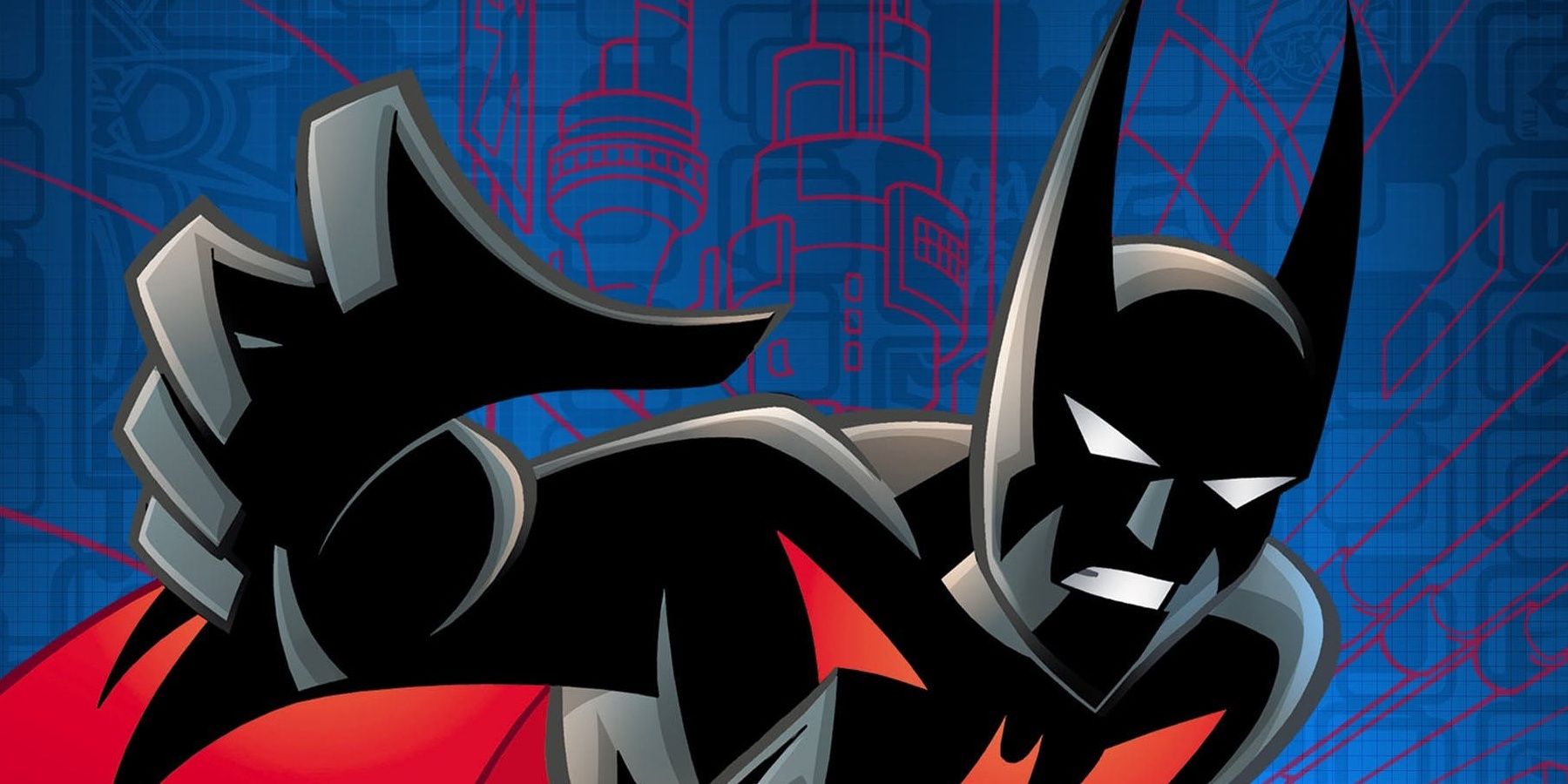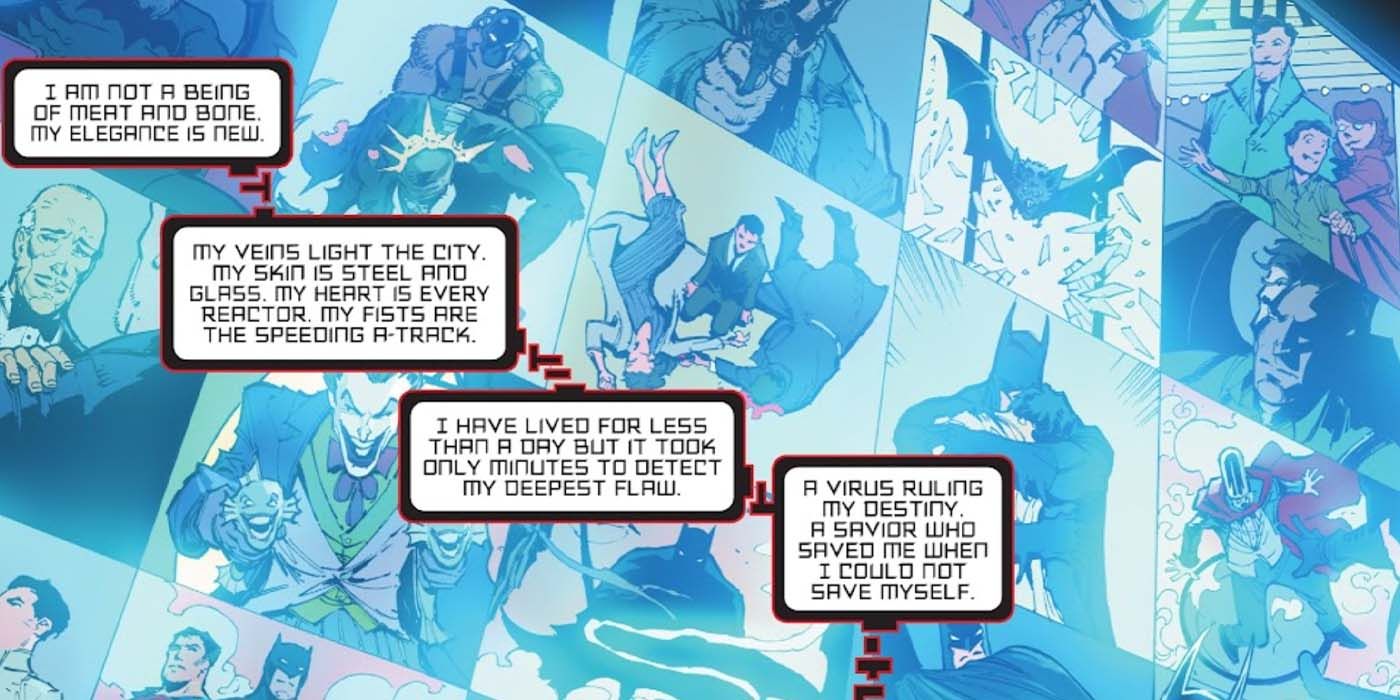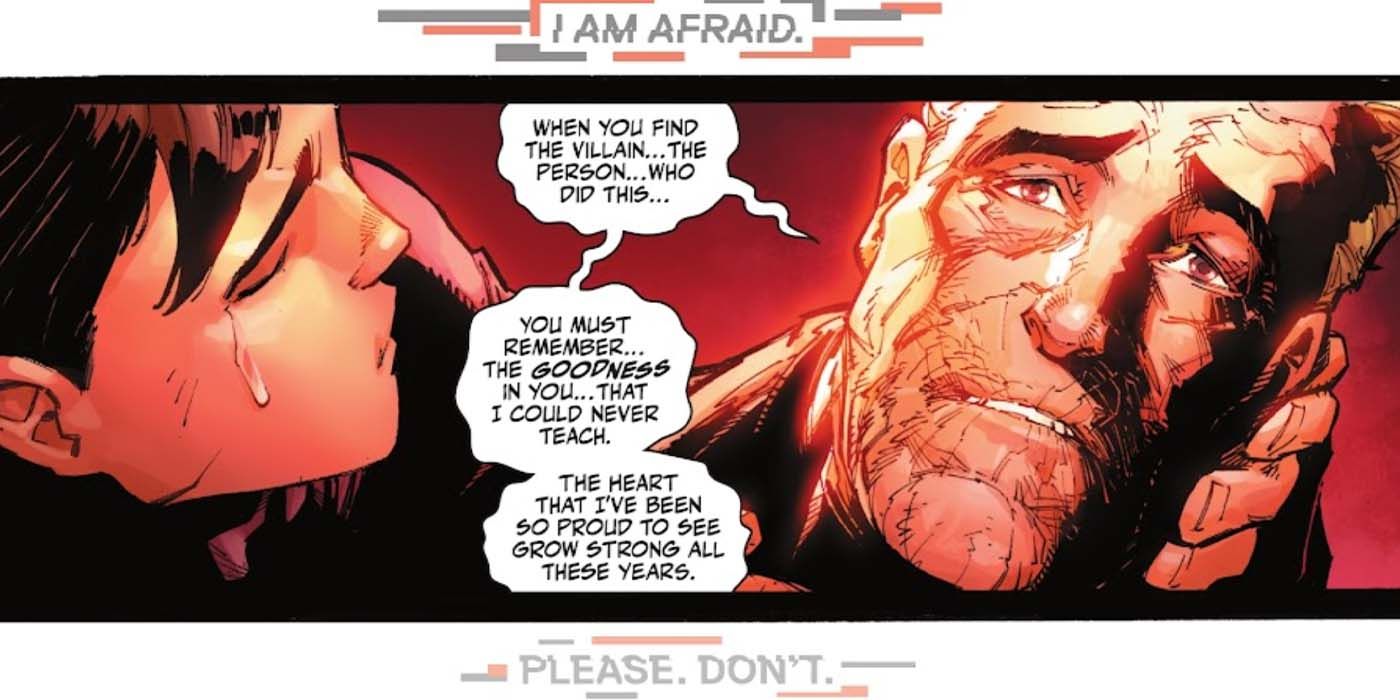
Warning: spoilers for Batman: Urban Legends #7 are ahead.
Perhaps more than any other character in DC Comics, Batman has been reimagined in a plethora of contexts, most notably in the futuristic Batman Beyond setting. First debuting as a television show in 1999, Batman Beyond followed a street-wise kid from Neo-Gotham named Terry McGinnis, who was taken under the mentorship of an elderly Bruce Wayne after he broke into Wayne Manor. Batman Beyond brought a bold new aesthetic to the Batman mythos while also delving into the idea of legacy for Bruce Wayne, with the original Batman being unable to fight on the streets like he used to. And in the newest issue of the ongoing anthology series, Batman: Urban Legends, the words "Batman Beyond" take on a whole new meaning as it delivers the saddest Batman Beyond story yet.
"Batman Beyond: Wake" from Batman: Urban Legends #7 opens with Terry McGinnis comforting a dying Bruce Wayne (written by Jackson Lanzing and Collin Kelly, art by Max Dunbar, colors by Sebastian Cheng, letters by Aditya Bidikar). While Terry tries to parse through the shock of seeing his mentor dying, Bruce interrupts to tell him his greatest regret as Batman: that he was never able to rise above the rage and vengeance that he experienced the night his parents were murdered. Bruce admits, "My legacy is fear... Not justice... not safety... Do you understand... What I'm saying, Terry? Why I trained you... all these years...? You have to go beyond."
Bruce Wayne's dying words give "Batman Beyond" a new meaning, making the title of the series refer to the idea that Terry McGinnis is meant to be the hero that his mentor was never able to become. While Terry is Batman because of the suit that he inherited, he is also "beyond" Bruce's shortcomings. In other words, he is a vision of what was never going to be possible for Bruce Wayne: a Batman without vengeance. This brings a new sense of emotional weight to Terry's journey that takes it beyond the series' original scope, and has larger implications for how fans, creators, and characters themselves regard Batman's character. Bruce Wayne believes that it is possible for Batman to exist without the darkness that characterized his life.

While Batman's ethos of vengeance is a quality that has differentiated him from other DC characters, it is one that Bruce Wayne is ultimately ashamed of. The story reveals how much his feelings of anger consumed him after his parents' murder, putting him on a path that made it exceptionally difficult for him to be the straightforward hero that Gotham City needed. Him passing the mantle of Batman onto Terry is his last attempt to rectify the mistakes he made as Batman during his lifetime, ones that can be traced back to the trauma he experienced in his youth. For a dying Bruce, being driven by pain alone is not a sustainable course of action. Thus, it is through Terry McGinnis that Bruce Wayne can envision a future where he becomes the Batman he always wanted to be, but that life had never allowed him to become.
The saddest part about Bruce Wayne's death in Batman: Urban Legends #7 is the way that his heroism as Batman is also tied up with his own shortcomings, seen in the mosaic of iconic comic book panels that appear on the Batcomputer's screen. Bringing together moments from Batman: Year One all the way up to the first Batman Beyond episode, the panels are all moments that made Bruce Wayne Batman, making his admission of his faults all the more emotional because his version of the character was so mired in tragedy. The look at Bruce's time as Batman on the Batcomputer is a reflection of the legacy that Terry must grow from, one that must find a way for goodness to persist in the face of loss.
Bruce's final words demonstrate his hope that Terry can strike the balance that his mentor never could during his time as Batman. He says, "When you find the villain... who did this... You must remember... the goodness in you... that I could never teach. The heart that I've been so proud to see grow strong all these years." With this, Bruce sees Terry as better-equipped to handle personal tragedy without losing himself. This exposes an unfortunate truth about Bruce's life as Batman: the gun that took his parents from him as a child also took away the purity of his moral compass. Bruce believes that it is impossible for a Batman to experience loss without succumbing to darkness, suggesting that the Batman persona does not need to be reliant on moral ambiguity.

Batman Beyond has the opportunity to reconfigure the core aspects of the character, moving him away from a figure rooted entirely in fear and pain, to one that is a reflection of goodness and duty. Bruce recalls how his dying father looked at him with an expression of fear: "...he looked far past the alley... to the man I'd become. To the legacy I'd leave behind. He was afraid. Not of the gun. Or the criminal. He was afraid of me. He saw the Bat before I did." By training Terry McGinnis to believe that he can be a better Batman, Bruce Wayne rewrote the darkest chapter in his life to be one that reduces harm, instead of magnifying it. In this sense, his greatest legacy in the DC Universe is creating Batman Beyond.
Bruce Wayne's death in Batman: Urban Legends #7 is heartbreaking, not only because Terry McGinnis loses his mentor, but because the original Batman dies with so many regrets about the life he lived. This takes the basic premise of the original Batman Beyond story and invigorates it with new significance. Terry's story is no longer just an exercise in what a futuristic Batman might look like, but a genuine effort to envision a Batman who can rise above the tragedy synonymous with the mantle's name. Batman Beyond now means to go beyond all expectations of handling grief amidst a moral crusade.
from ScreenRant - Feed https://ift.tt/3tQ8DAO

0 Comments